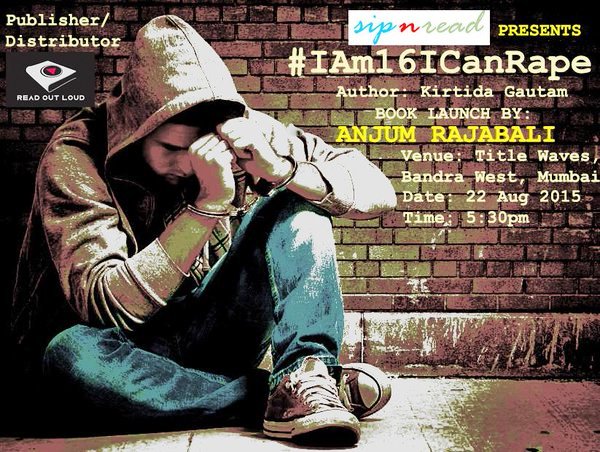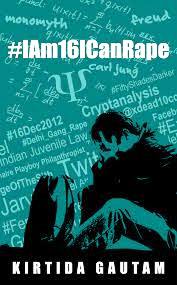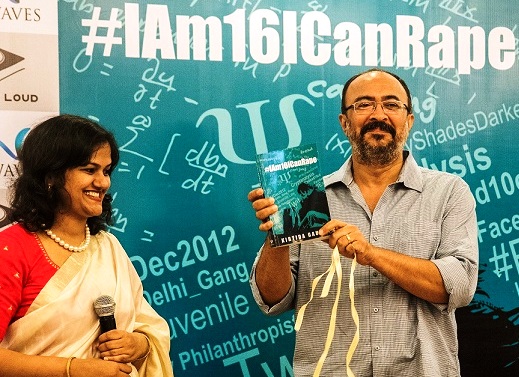|
|
||
|
Pro Tools
FILMFESTIVALS | 24/7 world wide coverageWelcome ! Enjoy the best of both worlds: Film & Festival News, exploring the best of the film festivals community. Launched in 1995, relentlessly connecting films to festivals, documenting and promoting festivals worldwide. Working on an upgrade soon. For collaboration, editorial contributions, or publicity, please send us an email here. User login |
Siraj Syed reviews screenwriter Kirtida Gautam’s thought-provoking novel, #Iam16ICanRape
Siraj Syed reviews screenwriter Kirtida Gautam’s thought-provoking novel, #Iam16ICanRape If a title like this cannot provoke you, and arouse immense curiosity, very little else will. A #hashtag that boldly declares its raison d’être, and alludes to a provision under Indian Criminal Law that only adults can be convicted of most crimes, younger convicted criminals being sentenced to time in a remand (reform) home. Even as author Kirtida was moving base to a new home in another continent, the law was amended in India, and now, ‘under-age’ rape offenders will be treated like their adult counter-parts. Her stand that there should be no mitigating circumstances for a person committing rape, and being under 16 years of age, or of any age, is no defence. Before I move on to address the book itself, it will be worthwhile quoting from her blogs. Here is an excerpt from 24 December 2015: “Is this amendment a proactive action to lessen the growing rape culture in India? As a clinical psychologist, I have my doubts about that. The swiftness, severity, and certainty of punishment are the key elements in understanding a law’s ability to control human behaviour. Any crime should be seen in totality of the crime committed. Not just in the law books. When it is clear, visible, and objective that the crime committed was not the product of a juvenile mind but the product of a mind that is capable of premeditation, then the juvenile justice system must waiver the accused to the adult court. And rape is one crime, which is ALWAYS PREMEDITATED. People can commit a murder in the spur of a moment, by mistake, but a person can’t commit a rape at the spur of the moment, by mistake. Therefore, the juvenile justice umbrella must be removed from law books in cases of coercive rape. I don’t propose to lower down the age limit to 16. It doesn’t make any sense. Tomorrow, a boy of 15 years might commit a rape and we will start the whole circus again. My concern is not 18, 16, 12, 10, 8, 6, 4, or 2… For rape, the juvenile justice system of this country must waiver the accused to the adult court. Waiver is the legal transfer of jurisdiction procedure over the juvenile offenders to the adult court for criminal prosecution. If a person is adult enough to commit the rape, the person is adult enough to take the punishment, period.”
#IAm16ICanRape-- That such a rapacious thread can exist on the Internet, even in a novelist’s imagination, should be a cause for deep concern. And screen-writer turned novelist Kirtida’s book is nothing if not an epic encapsulation of concern, anguish, and print vigilantism. The thread evolves into a multi-layered collage of a family, individual fads and foibles, demeanours and misdemeanours, ambition and class divisions, and, above all, about evil. “Who knows what evil lurks in the hearts of men? The Shadow knows.” Was a line that was made immortal by Orson Welles during his radio days, playing a character called The Shadow. The Shadow is a fictional character created by Walter B. Gibson, one of the most famous of the pulp heroes of the 1930s and 1940s. Born Kent Allard, the Shadow, who was gifted with mind-reading abilities, assumed various identities for his crime-fighting work, most notably that of Lamont Cranston. Most historical dictators and/or psychopaths have been geniuses first, and madmen later. Gautam reminds us that a perfectly normal looking and behaving teenager could be cultivating thought and ideas that, when put to practice, would seem too incredible, too dastardly to be true. Her Aarush Kashyap is just such a boy ‘wonder’. Talking to a criminal psychologist who works in courts, and who is also a lecturer, I put across my own pet theory that all humans are born truly evil, capable of all possible heinous crimes. Most of them either do not get the opportunities to commit the crimes they desire to. Parents and social upbringing, as well as experiences, merely stoke or douse their traits, to varying degrees. I have met a few hundred such persons, and my theory is based on a long-term study. Expecting her to get outraged, I was trying to prepare for the retort; instead, she said, “That is the first lesson I teach in class.” My theory that had felt vindicated after I had read Kirtida’s book now stood re-affirmed, though I wonder whether Kirtida has such strong views. And yet, not for one moment does she relent in condemning the unflattering figure of 100 rapes a day, in the country of her birth and upbringing.
Before taking to television and film writing, Gautam was a clinical psychologist. Her writing skills were honed first at the Dramatic Arts from Faculty of Performing Arts, Maharaja Sayajirao University, Vadodra (Gujarat), and then at the Film and Television Institute of India, Pune, where she found a mentor in the shape of Anjum Rajabali (Satyagraha, Chakravyuh, Aarakshan, Raajneeti, The Legend of Bhagat Singh China Gate, Ghulam Droh Kaal. Bagging TV writing offers early, she worked on Jodha Akbar and a show called Dharampatni.
It was Rajabali who released the book the book at a Bandra, Mumbai, bookshop, which is where I first met Kirtida, her family—parents Parukant Desai and Leena, and her husband, Mrityunjay Mishra, a techno-geek. Little did I know then that it would take me ages to write this review and that Kirtida would have by then migrated to the USA, a year ago. We are still in touch, though, on the Net, where I have been finding convincing ways of telling her why it took me so long. A chance meeting with Read Out Loud (the book’s marketing agency, which works on the principle, “You publish it. Leave the rest to us”)’s Mukti Jain had me listing my reasons for the inordinate delay. I kept reading a few pages a day. But after I had finished it, an avalanche of assignments kept it outside my reach. In turn, I asked Mukti what happened to the lecture tour that she wanted me to go on with her company, details of which were to have been decided nine months ago? That had been dropped, she clipped. Not even a line?! It’s a novel alright, and part of the treatment is thrilleresque. Yet, you cannot rush through this one like a best-seller. It is a treatise too. Very often, it takes a two-shot cinematic approach, followed by preambles to both characters, then comes individual dialogue, followed by words describing what was going on in their minds when they said what they did. At best, is as complex as the human brain, and worst, it is a psychologist’s attempt at character and behaviour analysis, and coming apart of the stuff that men and women are made of, Yin and Yang. Fictional characters, how-so-ever-much they might have been inspired from real life people, or amalgams of characters Kirtida met or heard/read about/saw, remain puppets on her keyboard: malleable, ductile, flexible and pliable. Her forté is setting you up with a line of action, then, when you are flowing one way, quite like in cricket, something goes against the run of play, and either a catch is dropped or a wicket falls. That she is deeply aware of the falls in moral standards and the dark side of uncensored media that has occurred over the last 40 years or so is for all to see. Her ‘hero’ is an antagonist, a teenaged rapist whose mind-boggling IQ hovers in a plasma that is jet black for most parts, but with some shades of white and grey, that help him cover his tracks and pass off as normal. Aarush’s grandfather Rudransh is the protagonist, a man whose values were forged 60 years ago and who begins to believe that a grandson’s gruesome crimes are, at least in part, his burden too. That he takes this burden quite literally is bizarre, but then those were bizarre times. Parallel to Konstantin Stanislaski’s classical Method Acting theory, there is a school in writing that calls itself Method Writing. Gautam chooses this method to let characters develop. And maybe Anjum will smile at that, from the corner of his lips. Kirti, like Shanti and Kanti, is a name that is gender agnostic; both men and women bear these names. And Kirtida is a derivative of Kirti, meaning fame. Kirtida is one who bestows fame. And here she is, garnering it for herself. Her likes include chai and chess. Chess it had to be. The chapters are quite like a chessboard, with all pawns, kings, queens and bishops being subjected to a writer’s roulette, which rolls inside a time-machine. There are scientific and mathematical analyses and medical theories, references to master psychologists, of then and now (Freud? You bet). Vadodadra-born Kirtida lists Carl Jung, Joseph Campbell, Herman Hesse, The Mahabharata, The Ramayana, Jean Paul Sartre and Albert Camus as her influences, One psycho-evolutionary theory that comes right at the end is going to raise a million eyebrows, and will force scholars to rethink the dissected, solidly construed premise of genetics of rape. Rape is male suppression of and dominance over woman? Theory or postulate? Think again. Contemplate. Read the book. -------------------------------------------------------------------------------------------------------------------------------------------------------------------------------------- Quotes from the book “You cannot stop loving your child because you know that he has committed a wrong action. But you certainly stop loving yourself for loving him. ~ Rudransh Kashyap “Self -pity is the worst form of poison. It kills a person without the person realising it” ~~ Aarush Kashyap “People say that every person plays the lead role in the movie of their own lives. I don't. I play a side character even in my own life's movie.” ~ Mrigank Kashyap “I am not the Hero of this story Bob is ~ Aarush Kashyap Three weeks ago, I found this on her Twitter page. Kirtida Gautam @KirtidaGautam Dec 3, 2016 --------------------------------------------------------------------------------------------------------------------------------------------------------------------------------------- Is this just me or someone else also feels complete despondency? So much so that I am on the verge of giving up. I have been trying to give-up for 48 years, very, very seriously, and in the last 10 years with renewed vigour. My sincere hope is that your despondency is a passing phase, and nowhere near the parasite that my despondency has become, chewing my brain all the time. Not to mention my body. More fame awaits, Kirtida. Get on with that your next, the Second Part of the #YinYang brace! #2 is on the way. And avoid book- reviewing. Reviewers are not a loved species. NOBODY loves a reviewer, unless he is biased towards the reader’s/viewer’s favourites. The only true critics and reviewers are those who have no favourites, or forget who their favourites are once they get on with their jobs. Lastly, how is this for a husband’s promo for his wife’s book? Rating: *** Trailer: https://www.youtube.com/watch?v=5bMHbe5BmAg 20.12.2016 | Siraj Syed's blog Cat. : PEOPLE
|
LinksThe Bulletin Board > The Bulletin Board Blog Following News Interview with EFM (Berlin) Director
Interview with IFTA Chairman (AFM)
Interview with Cannes Marche du Film Director
Filmfestivals.com dailies live coverage from > Live from India
Useful links for the indies: > Big files transfer
+ SUBSCRIBE to the weekly Newsletter Deals+ Special offers and discounts from filmfestivals.com Selected fun offers
> Bonus Casino
User imagesAbout Siraj Syed Syed Siraj Syed Siraj (Siraj Associates) Siraj Syed is a film-critic since 1970 and a Former President of the Freelance Film Journalists' Combine of India.He is the India Correspondent of FilmFestivals.com and a member of FIPRESCI, the international Federation of Film Critics, Munich, GermanySiraj Syed has contributed over 1,015 articles on cinema, international film festivals, conventions, exhibitions, etc., most recently, at IFFI (Goa), MIFF (Mumbai), MFF/MAMI (Mumbai) and CommunicAsia (Singapore). He often edits film festival daily bulletins.He is also an actor and a dubbing artiste. Further, he has been teaching media, acting and dubbing at over 30 institutes in India and Singapore, since 1984.View my profile Send me a message The EditorUser contributions |






























